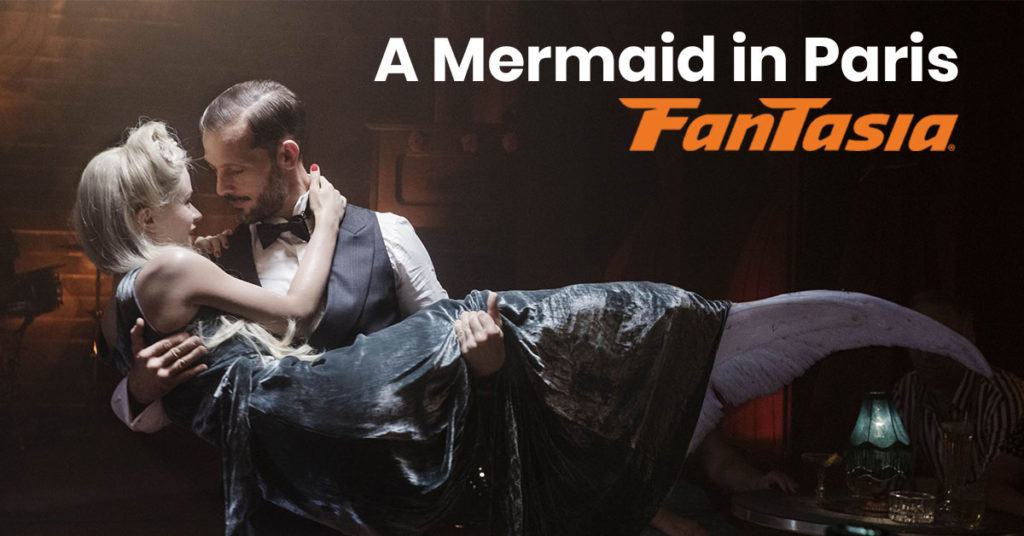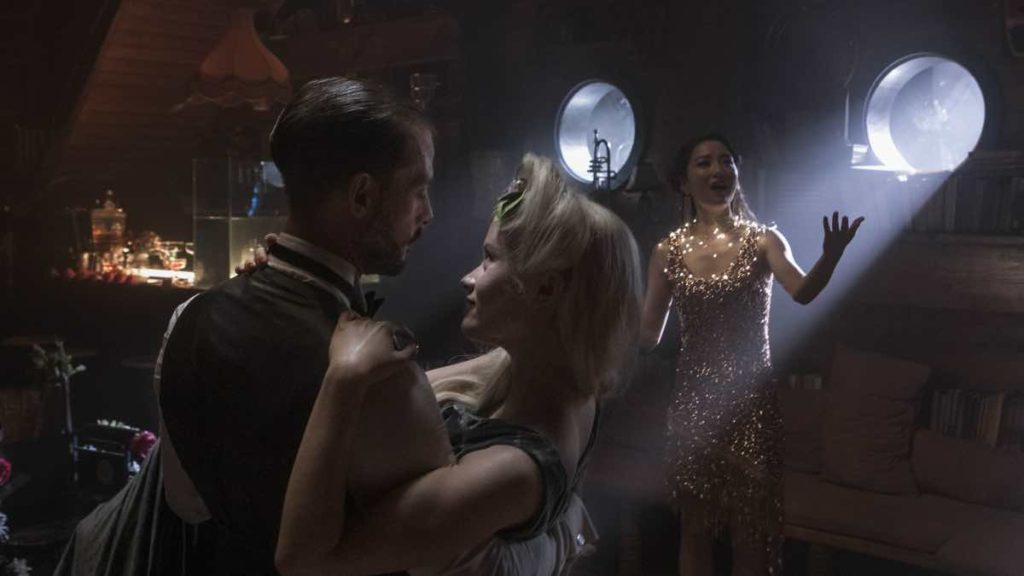A Mermaid in Paris feels like a cross between Amélie, Moulin Rouge, and Paddington — only very, very French. This is part of our coverage of the 2020 Fantasia Film Festival, which runs until September 2. Films are available to screen online in Canada for $8.

What do you do when you spot an injured mermaid in the street? If you’re roller-blading musician Gaspard (Nicholas Duvauchelle), it’s simple: take her to the hospital for medical attention, and then take her home to your bathtub. Little does he know that the mermaid’s song has killed every man who has ever heard it. Despite repeatedly singing at him, the mermaid fails to kill Gaspard, who is much too preoccupied with disinfecting and then bandaging her wound. When she realises he may be the first man to be immune, she introduces herself as Lula (Marilyn Lima).
A Mermaid in Paris feels like a cross between Amélie, Moulin Rouge, and Paddington — only very, very French. Gaspard works at his family’s nightclub on a boat where the emcee looks like he gets his styling tips from Harold Zidler. The nightclub’s history is chronicled in an animated popup book that seems straight out of Paddington 2. And when he brings Lula into his home, there are some unexpected dangers of having a mermaid house guest, especially when she decides to try cigarettes. Meanwhile, the perpetually wet nighttime streets, bright reds, blues, and greens, and quirky supporting caricatures make the film feel like a cousin to Jean-Pierre Jeunet’s films — with the romance of Amélie, and the incredible production design of his earlier works.

In other words, A Mermaid in Paris is a gorgeous, whimsical delight that’s never too twee. At the heart of the film is a romance between the mermaid who can’t be around men without them dying from falling in love with her, and a lonely man who learns to open his heart again. Along the way, there are some delightful sequences involving introducing Lula to television, the pair recording an album, and a nighttime adventure through Paris. Writer-director Mathias Malzieu’s first feature, Jack and the Cuckoo-Clock Heart, is an animated film, and there are certainly remnants of that sensibility in this film, which starts with a stop-motion title sequence, and features all kind of delightful little trinkets that wouldn’t be out of place in Wallace and Gromit, but with a distinctly French twist.
The final third of the film gets dragged down a bit by a subplot involving a doctor whose husband falls victim to the mermaid’s song. It starts out entertainingly, when the doctor discovers some blue goo on the street and has it analysed in the lab; there’s an amusing gag that follows about how it’s definitely Lula’s blood and has low oxygen content. But it then starts to feel like an unnecessary plot contrivance to get Lula captured, set free, and then in a race against not just time but the nefarious doctor. It feels like a whole lot of unnecessary plot to ramp up the stakes, even though what we really care about is the relationship between Gaspard and Lula, and how impossible their love is on land.

Still, this is a film that is very much all about the details rather than the plot. I adored Lula’s tail which lights up with LED lights. When she starts living in Gaspard’s bathtub, he puts her in a “Johnny Cat” t-shirt, a bespoke t-shirt with a picture of his cat named Johnny Cash. And when every cab in the city refuses to pick up Gaspard and his injured mermaid so he can take her to the hospital, he has to get an almost cartoonish three-wheeled car to take him around town. Rossy de Palma has a supporting role as this film’s Georgette, Gaspard’s nosy neighbour who is always there to encourage his romantic entanglements and help with any plan. Even when Gaspard is without his trademark roller blades, he still slides and glides across the ground like a cartoon character. The costumes and production design are so detailed and gorgeous that every minute is a lovely discovery.


